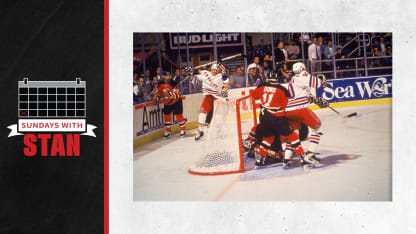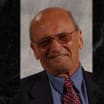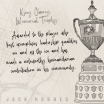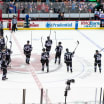With seven seconds remaining in Game 7 of the seventh and final game of the 1994 Eastern Conference Final between the Devils and Rangers, the score was tied 1-1.
Valeri Zelepukin's tying goal had stunned the Garden crowd and the Rangers.
Referee Bill McCreary's failure to penalize Mike Richter after the Rangers goalie pushed the official into the boards surprised the Devils. But at that time and place there was nothing coach Jacques Lemaire could do about it.
Once the buzzer ended the third period, Lemaire and his partner Larry Robinson herded their troupe into the Visitors' dressing room. The McCreary blunder no longer was an issue.
"We had to figure out how to score the next goal," said Bill Guerin, who had become one of the Devils leaders. "We didn't need McCreary's help to win the hockey game."
The Greatest Game's Stunning Finish | SUNDAYS WITH STAN
The NHL's greatest game and series came to a sudden and stunning conclusion in the second overtime period

sundays with stan
DEVILS-RANGERS, 1994 EASTERN FINAL
Part 10: Game 7's Frantic Regulation Finish
Part 9: The Start of the Greatest Game
Part 8: 'One Hell of a Third Period'
Part 7: Happy Half of Game 6
Part 6: Prelude to Game 6 Melodrama
Part 5: The Devils' Offensive
Part 4: Ultra Suspenseful Game 3
Part 3: Can the Devils Do It Again!?
Part 2: Devils Upset Rangers in Game 1
Part 1: Prelude to the Historic Series
At the end of three periods the shot totals were close enough; 27 for the Rangers and 24 for New Jersey. The Devils were far from dead.
Down at the other end of the dressing room corridor, the Rangers had too many veteran pros to be seriously shaken by their lost lead; stunningly late as it was.
"These things happen," said Kevin Lowe, the Rangers defender, who had starred for a host of Edmonton Oilers champions. "We just had to go out and play hard and smart in overtime. And hope we get a bounce or two."
In the old days it would have been called "Kitty Bar The Door" hockey which simply meant being careful and accenting defense.
That was second nature to New Jersey; not so much for the Rangers. In fact the Blueshirts now turned their attention to offense and physical play.
Alexei Kovalev's high stick on Bruce Driver was a non-call. Late in the period, Sergei Zubov briefly knocked out Bobby Carpenter and, once again, the officials "let them play."
The decisive factor was that the ebb and flow had been just about even and so was the goaltending. Richter had to be extra sharp. Ditto for his defenseman Jeff Beukeboom, who defused a dangerous 2-on-1 featuring Bobby Holik and Randy McKay.
As the first overtime wore on the physicality increased. At one point Guerin flattened Lowe behind the Rangers net. The whistle blew but there was no penalty on the play; just a time-out while Richter helped revive his top backliner.
"By this time the tension was beyond belief," said Fred Meier, a postal worker from Greenwood Lake and former roller hockey star. "As a Rangers fan, I kept wondering if the '1940' curse still was in play."
Mike Keenan kept searching for the best offensive unit. One third-liner he never had forgotten was Brian Noonan, a player he had induced GM Neil Smith to obtain in a trade.
Noonan came close late in the first overtime when he outraced Devils defenseman Tommy Albelin to gain shooting position at the right circle. The Rangers sniper got good wood on his drive but it was streaking wide of the net.
"At this point in time," Brodeur recalled, "I wasn't going to take any chances so I decided to catch the puck and get a faceoff."
What impressed some of the press box analysts was the calm that exuded from Brodeur's crease despite some late first OT pressure. Marty remained magnificent, even amused at time.
Near the 20-minute mark, Noonan nearly was rewarded for his diligent play. After teammate Craig MacTavish re-directed the flying puck to his linemate, Noonan placed it flat on the ice and fired point blank at Brodeur.
When Denis Brodeur - Marty's goaltending father - was instructing his son, one "old school" technique Denis imported from the past was "pad stacking."
And that's precisely what Marty did, making the save on Noonan's while also saving the first overtime period for his hockey club.
"For one thing," concluded Devils defenseman Ken Daneyko, "Marty was getting better as we went along. The other question was whether we somehow could solve Richter at their end."
Nobody could answer the question at that moment. And that's why the players galumphed to their dressing rooms to prepare for the second sudden death period.
…
After the Rangers had defeated the Devils in the 1994 "Greatest Series Ever," club owner Dr. John McMullen actually was able to crack a joke.
"I know I'm never going to die of a broken heart or a bad stomach," Doc Mac chuckled, "because if that were the case, it would have happened already."
Like others in the high command, the owner had a right to wonder why the Devils failed to win Game 7 of the double overtime finale. He knew that the final result would be cause for conjecture 'til the cows come home.
This much is certain; Lady Luck divorced the Devils the moment when referee Bill McCreary failed to penalize Rangers goalie Mike Richter. That was the turning point of all turning points.
If a player vigorously pushes an official into the boards, it's a penalty; minor or misconduct. When Valeri Zelepukin had tied the game with only 7.7 seconds remaining Richter pushed McCreary - hard. Yet, the official froze his whistle and a potential Devils power play and series winner faded like smoke rings.
But "Luck Be A Lady Tonight" sure was the Rangers theme and it showed during the intermission that separated the first and second overtime periods.
Granted it was an innocent enough episode but it had Lady Luck's fingerprints all over the place. You could call Stephane Matteau's skate laces Exhibit A among the evidence. In any event here's what happened:
"As Matteau began lacing his skates to go on to the ice for the second overtime," said MSG Networks John Giannone, then the Daily News beat writer, "he knew something was wrong. The lace was broken on his skate.
"So he had to take his skate off and put a whole new lace in. Meanwhile he was in the dressing room with the Black Aces, the guys who were scratched from the lineup. One of them was Eddie Olczyk."
Matteau knew that Olczyk was an expert on horse racing so he figured that Eddie knew something about good fortune and maybe could give him a boost before taking the ice.
Giannone: "Matteau said to Eddie Olczyk, 'Bring me some luck.' So Olczyk grabbed his stick and kissed the stick blade. When Steph got out of the dressing room, he noticed that the NHL's Prince of Wales Trophy was sitting on a table between the locker rooms.
"Matteau went over to the trophy and actually touched it for good luck although hockey players always had been taught that touching the Wales thing was supposed to bring bad luck.
"He had made a decision that flew in the face of decades worth of superstition. So there he was, late to the second overtime which already had begun."
By the time Matteau had reached the Rangers bench, plenty of opportunities had transpired for both sides although the accent was on the home club.
"It was amazing," said author Tim Sullivan, "how the Rangers refused to get frustrated. They kept pushing forward. They kept attacking."
In between, the Devils broke through when Richer fired at Richter with Bernie Nicholls desperately trying to screen the Rangers goalie. But Richter managed to foil the attempt.
At this point in the second overtime a very critical change took place which differed from the previous ebb and flow. It was so apparent to one of the SportsChannel producers that he turned to a colleague and whispered:
"Something's gone wrong with the Devils; and it doesn't look like a strategy thing. Whenever they get the puck in their zone, they're not skating or passing it out. They're just flinging it to center and hoping for the best."
This was not a one-time thing but rather a pattern of desperation. I vividly recall telling our stat person, "We're giving the Rangers opportunity after opportunity. This is not good."
Now it was the Rangers Brian Noonan who had the puck and passed it to Glenn Anderson. Suddenly, the Rangers erupted with a 2-on-1 break. The only Devils defenseman back was the aging Russian Slava Fetisov.
Anderson, one of the more accurate Ranger shooters, let his drive go from the circle but Brodeur managed to make the save but, somehow, the puck drifted behind the net from where it skimmed to the left corner.
New Jersey's John MacLean got to it first but by this time the Devils seemed trapped in their own desperation syndrome. Instead of waiting for a free teammate, MacLean simply lofted the puck to center.
Seeming to sense that their foe had become irreparably disorganized, the Rangers did a "Thank you very much" and organized yet another rush.
Blueshirts defenseman Jeff Beukeboom caught MacLean's Texas Leaguer and quickly settled it flat on the ice. That enabled coach Mike Keenan to make a line change.
"Because Matteau had been tied up, putting a new set of laces on his skates," Giannone remembers, "he was late to the bench. Well, he finally made it and he was fresh because he hadn't skated for a half-hour."
The tired Devils also made a change and now it was a matter of which team could control the puck for a sustained play on goal.
Eventually, Beukeboom, at the left point, drilled the rubber - good and hard - into New Jersey's end of the rink. Once again, the Devils tried to organize; or at the very least relieve the pressure.
This time Fetisov had the biscuit and the fatal mistake unfolded. Giannone detailed the precise play in author Matthew Blittner's oral history, Unforgettable Rangers.
"Fetisov went to pass it across the ice to his defensive teammate Scott Niedermayer," Giannone recalled. "but the puck bounced off Esa Tikkanen's skate and off to the backboards."
Tim Sullivan, who also had followed the play, later noted that Fetisov's safest move at that moment was to loft the puck to center the way MacLean had done it minutes earlier.
But the puck that Fetisov had earmarked for Niedermayer took an unexpected detour and was up for grabs. As it happened, Matteau had just completed the line change and leaped over the boards, hellbent for the loose puck.
Giannone: "Niedermayer was caught flatfooted. And because Matteau had jumped on the ice, he had a full head of steam from the far bench. That enabled him to get a half step on Nieder and he poked the puck past him."
But Matteau was not in a normal scoring position and he still had three Devils who just might disrupt his charge: Neidermayer, Fetisov, and Brodeur, the goaltender.
"Now Niedermayer is following Matteau," added Giannone. "As Matteau goes behind the net, Nieder realizes that he won't be able to catch Steph so he literally fish hooks him, putting his stick right in his right arm and pulling back.
"He almost looked like he was water skiing and could have been called for 'hooking.' But there was no penalty called."
In retrospect, the Devils wished that a penalty had been called; at least that would have halted play. But Scott's attempt at "fishing," boomeranged on him and his hockey club.
"Because Matteau was yanked by Nieder," Giannone concluded, "it caused his body to actually turn to where his chest was now facing the ice. That little tug pulled him into position where the only thing he could do was throw it in front."
Which is precisely what he did.
From my viewpoint - and others - it seemed like a routine wraparound that could have - should have! - been prevented by an alert Brodeur covering all possible wraparound angles.
It's not that Marty was asleep at the switch; he was aware of the threat but, again, Lady Luck and the Law of Gravity were working for the Rangers at this moment.
Giannone: "Marty went down with his paddle and it hit off his stick and it popped up in the air and slid right between his legs. It was hard to believe that it actually got past Brodeur. Looking at it, I figured that there was no way that that puck was going to go in."
But it did and Devils fans forever debated whether Marty should have stopped it. Certainly, the impartial critics believed that, yes, he should have stopped the thrust.
"After a magnificent effort all night long," Sullivan concluded, "Brodeur let one in he should have stopped."
Jim Dowd was the first Devil to see the rubber cross the red goal line. "I saw it go in," said Dowd, "and I was numb."
Mister Devil, Ken Daneyko, best analyzed the traumatic moment simply and precisely. "It was a shame it had to end on a fluky, bad goal, but that's hockey."
The good news for the Devils was multiple. Despite the blow to the franchise's solar plexis,the sun came up the next morning in the east.
Jacques Lemaire was voted coach of the year, Scott Stevens was voted to the First All-Star Team, while leading the league in plus-minus and Marty Brodeur, as expected, won the Calder Trophy as rookie-of-the-year.
Plus, the Devils had made an important statement to the rest of the NHL.
They will be a team to be reckoned with - right away.


















